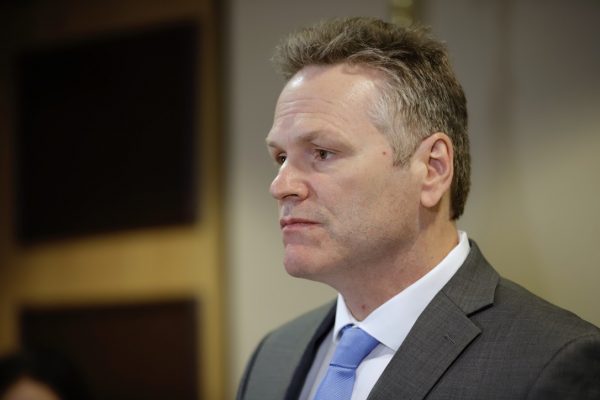
Gov. Mike Dunleavy on Monday announced that all state-operated libraries, archives and museums will be closed to the public for the rest of the month.
He also directed all residential boarding school programs to start sending students home in an effort to curb the spread of the coronavirus.
Dunleavy made the announcement around 5 p.m. on Monday during a news conference streamed online. Reporters were asked to call in to the briefing instead of participating in-person in an effort to practice social distancing, Dunleavy’s office said.
“There is no reason to panic, but there is reason to be concerned,” Dunleavy said.
Dunleavy said he signed two bills into law on Monday: One will provide $4 million to the state health department for its response to COVID-19, the illness caused by the coronavirus. The department will hire temporary workers statewide, he said. The bill also allows the state to accept federal money for its response, Dunleavy said. The other bill will require health insurers to provide coverage for telehealth benefits — the delivery of health care by phone, video or online.
“With the COVID-19 pandemic, the CDC and the Alaska chief medical officer have encouraged anyone with flu-like symptoms to utilize telehealth benefits before overloading the health care system, especially our emergency rooms,” Dunleavy said.
Alaska announced its first confirmed case of COVID-19 on Thursday. State officials described the man as a cargo pilot who had recently arrived in Anchorage.
By late Monday afternoon, the state had recorded no new cases of COVID-19, said Dr. Anne Zink, the state’s chief medical officer. A total of 250 people have been tested, with 249 negative results, she said.
Nearly three hours after the news conference, however, the state announced two new cases of COVID-19 from two patients in the Fairbanks area. The cases are “presumptive positive,” meaning that the lab cases will be sent to the Centers for Disease Control and Prevention for confirmation. The individuals had been traveling in the Lower 48, said the statement from the governor’s office.
Related: Two new coronavirus cases found in Fairbanks
At the news conference Monday, Zink reminded people that the more everyone can distance themselves from each other, the more it will slow the spread of the disease. She said it feels like Alaska is standing at the edge of the ocean, and there’s a gigantic wave coming, referring to the coronavirus.
“As Alaskans, we need to know that this is coming, but I also think it’s really important to know that we can do a lot to be prepared for this,” she said. “The more that we do this, and the more that we work together, the more we can slow that wave, and we might get a little wet, but we can weather that storm together.”
Across the globe, the coronavirus is closing schools, colleges, restaurants, gyms, bars and other businesses.
On Friday, Dunleavy closed schools to students until March 30. The University of Alaska system also moved most of its classes online and asked students to leave dorms for the rest of spring semester.
In Anchorage last week, Mayor Ethan Berkowitz ordered the closure of all municipal libraries and civic, cultural and recreational facilities through the end of the month.
Earlier Monday, Berkowitz also issued an order banning dine-in service for food and drinks at restaurants, bars and breweries to prevent the spread of the coronavirus. His order also closes gyms, bingo halls and theaters, and it bans gatherings of more than 50 people, though it does not apply to grocery stores. Berkowitz’s order took effect Monday at 5 p.m. and lasts through the end of March.
Related: Anchorage suspends restaurant dining, bar service
Dunleavy said he spoke with Berkowitz on Monday, and the mayor acted out of an “abundance of caution for the Municipality of Anchorage.”
Asked if Dunleavy was considering enacting similar bans statewide, including closing restaurants except for take-out, Dunleavy said: “We have that discussion every day, sometimes twice a day. We’re trying to keep ahead of this spread of this virus. One of the trigger points that we would be looking at is if we had a community infection.”
Dunleavy said if someone who lived in Alaska tested positive for COVID-19, the state would give “serious consideration to limiting the ability for folks to go to restaurants, movie theaters, etc. statewide.”
“We’re not there yet,” he said.
Dunleavy said the situation is dynamic.
“That may change tonight, that may change tomorrow and that’s why people need to stay tuned in because things are going to potentially move quickly,” he said.
By Monday, the governor had not closed state offices. He said conversations are ongoing about the state’s thousands of employees, including who can work from home and who cannot. He said he expected to have more information later this week.
“We have to be very careful that we don’t shut down aspects of state government, but at the same time provide for the health and safety of our state workers,” he said.
Across the United States, there were about 3,500 cases of COVID-19 by Monday, and 68 deaths, according to the CDC.
The virus is thought to be mainly spread from person-to-person — between people who are in close contact with one another and through respiratory droplets produced when an infected person coughs or sneezes, the CDC says. The agency recommends that people wash their hands often, avoid close contact with sick people and stay at home if they’re not feeling well. It’s also recommending that organizers cancel or postpone in-person events of 50 people or more throughout the country for the next eight weeks.
Related: Read more coronavirus coverage from Alaska Public Media.
Reach reporter Tegan Hanlon at thanlon@alaskapublic.org or 907-550-8447.
Tegan Hanlon is the digital managing editor at Alaska Public Media. Reach her at thanlon@alaskapublic.org or 907-550-8447. Read more about Tegan here.





